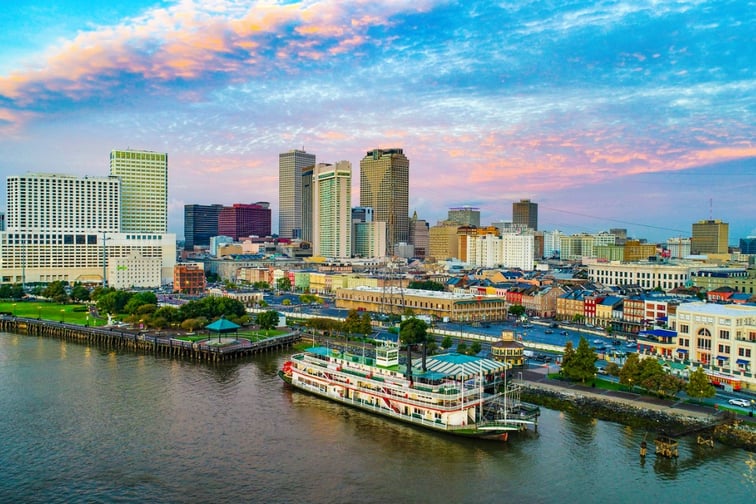

Market watchers and participants have noticed an uptick in new legal entrants and public adjusters entering Louisiana as firms look to grab a slice of the claims pie - and some are using “concerning” tactics, industry insiders have warned.
The beleaguered state is contending with an exodus of property capacity – insurance agents have been involved in the scramble to rehome approaching 100,000 policies following insurer exits and failures – after two years in a row of hurricane hits from Laura, Delta, Zeta, and Ida.
Property insurance costs have risen sharply in Louisiana, with homeowners already paying an average of $2,009 a year, or 45% above the national average, according to Bankrate.
Market sources told Insurance Business they were concerned that new marketing tactics would add to Louisiana’s insurance woes.
“We have seen a large influx of out-of-state law firms that use disturbing marketing practices promising to recover large claim settlements before even examining the claim,” said Independent Insurance Agents & Brokers of Louisiana CEO Jeff Albright.
“These opportunistic law firms create unreasonable expectations for policyholders with the hope of ‘easy money’ and only increase litigation and the cost of claims.”
Plaintiff and defendant lawyers established in the Pelican State told Insurance Business that they had seen new players entering, particularly since 2021’s Ida.
The issue is not that there is not enough business in Louisiana to go around, according to plaintiff attorney Galen Hair, partner at Insurance Claim HQ, but that recent entrants are using “aggressive” marketing tactics, including unsolicited text messages, television slots, letter campaigns, and Tik Tok adverts.
Messaging has allegedly included that “your time to file a claim is running out” and that there is a “secret” way for policyholders to make money from their insurance company.
Meanwhile, there are concerns that law firms will focus on swooping in to pick up business and service claimants later, leaving policyholders who have been left reeling from a hurricane impact struggling to move forwards.
“What I don’t think anyone’s prepared for, from any economic or public good aspect is when any firm – let’s say, in Texas, for instance – says ‘OK, so what we’re going to do is we’re going to come to New Orleans and we’re going to spend as much money as we have to [in order] to pick up as many people as possible, and then we’ll figure out how to get those people served later’,” Hair said.
“These are legal services for people that have been hurt by a disaster and are not being paid well by an insurance company – it’s not an Amazon seller producing the latest fidget spinner where they take a million orders and figure out how to make up the backlog.”
The Louisiana State Bar Association has a near 50-page handbook on how lawyers can – and cannot – market their services.
Several adverts he has seen from recent entrant out-of-state firms, Hair alleged, have not been compliant – “you can verify almost immediately that it’s inappropriate advertising,” Hair commented.
Matthew Monson, founder of The Monson Law firm, a defendant practice, said he had seen examples of legal or claims businesses from “seven or eight” states entering the market, and that he too had seen “inappropriate” advertising.
In some cases, adverts that Monson saw allegedly left claimants in the dark about which law firm they were signing up to until the end of the process after they had completed a survey.
Monson was skeptical that firms face harsh enough penalties for customer acquisition tactics, with some raking in tens of millions of dollars at a time when the public could be “vulnerable”.
Some attorneys are coming in “chasing storms” and could be using “improper” practices, Monson said, as they look to pull in fees. He said he was aware of one firm that had swept up 7,000 claimants, a number he described as “crazy” for Louisiana.
“The challenge with it is, they’re taking the obscene profits that they’re making in Florida and using that to come and literally attack other states,” Monson said of the legal and adjuster influx.
“It’s on the backs of the average person who might not be able to afford another $1,000 a year for their insurance.”
Monson looked to Florida as an example of a market even deeper in crisis, and said he feared that outsiders could look to move Louisiana in the same direction.
Seventy-nine per cent (79%) of US homeowners’ insurance lawsuits come from Florida but claims in the state make up just 9% of homeowners’ claims nationwide, according to data from the Florida Governor’s Office. Carriers have exited in droves and rates have soared, despite the state experiencing no major hurricane hits since 2018’s Michael.
Florida’s one-way attorney fee statute has been partially blamed by some market sources, including ratings agency Demotech president Joe Petrelli, for the in-difficulty market’s attractiveness as a litigation target.
Louisiana does not have the same statute, but it does have back pay – “if you don’t pay your claims timely, and your failure to pay the claim timely is because you’re acting in an arbitrary manner, you’re subject to penalties of 50% of the amount you should have paid, plus attorney’s fees,” Monson said.
Meanwhile, Louisiana remains the only state that bars public adjusters from charging contingency fees. The insurance industry swerved a change on this when Senate Bill 186 was pulled this summer, but Monson said he fears a more organized return of a similar Bill next year.
“They can literally turn Louisiana into Florida,” Monson warned.
